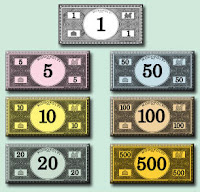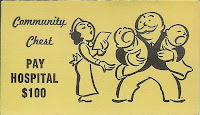 How do you introduce someone to this "budgeting" deal? I know most people have heard the word "budget" and know the general premises of it, but does it really work? Would it apply to me? What are my choices and how do I need to get started?
How do you introduce someone to this "budgeting" deal? I know most people have heard the word "budget" and know the general premises of it, but does it really work? Would it apply to me? What are my choices and how do I need to get started?What do you need to get started? Pencil, paper and time. A spreadsheet or word document in your computer (or uploaded online for easy access) is also a good choice too. Another thing I'd recommend is a calendar you can write on, to put in due dates and other tidbits of info.
First things first... what's your goal? Do you want to have better control of your bills so you're not wondering if you have enough cash to cover expenses? Are you trying to get rid of debt? Mapping a path to save $5,000 for that fancy vacation, new car or party? Save more for your retirement or college funds for the kids? Whatever it is, write it down.
What is budgeting and what can it accomplish?
Budget: (n) An estimate of income and expenditure for a set period of time.
Making a budget is nothing more than being fully aware of where the money is coming from, and where it is going. It is tracking your expenses, recording your income, accounting for all of your bills and sticking to limits you've agreed on. That means that when you get your paycheck, you have a good idea of how that money will be spent, where and when. You also know that you have, i.e., a $100 allowance for food until next paycheck, so going to that restaurant that's going to cost you $60 may be out of the question!

What it will NOT accomplish on its own:
Depending on your debt burden, goals or plans, it may take months or even years to reach where you want to go. The act of creating a budget is not a "get out of jail free" card. It may not solve all of your problems, and it may not let you keep your current lifestyle, if you are living outside of your means. It will only assist and guide you. You have to make the changes.
Now that's out of the way, let's get on with the first phase; gather information and document!
Steps to creating a budget:
 1) Know your bills. No, I don't mean monopoly money ones, but your expense/income stats. That means you must gather and document every single utility/ membership bill, every source of income and paycheck, and every expense including estimates of 'possible' expenses like that cousin's wedding in June, your son's yearbook or your pet vet visits. Don't hide or exclude irregular side income or ignore a semi-recurrent expense like alcohol or tobacco. Be honest. Write down all due dates and the days you get paid. If you need to estimate things like groceries, look at a 3 month average if possible. Get the best, most realistic picture you possibly can.
1) Know your bills. No, I don't mean monopoly money ones, but your expense/income stats. That means you must gather and document every single utility/ membership bill, every source of income and paycheck, and every expense including estimates of 'possible' expenses like that cousin's wedding in June, your son's yearbook or your pet vet visits. Don't hide or exclude irregular side income or ignore a semi-recurrent expense like alcohol or tobacco. Be honest. Write down all due dates and the days you get paid. If you need to estimate things like groceries, look at a 3 month average if possible. Get the best, most realistic picture you possibly can. 2) Sort, list and categorize the cards. Divide them into fixed income/ expenses and variable income/ expenses. List them side by side and tally them up. Which are mandatory and which are optional/could-do-without? Is your income less than your expenses?
2) Sort, list and categorize the cards. Divide them into fixed income/ expenses and variable income/ expenses. List them side by side and tally them up. Which are mandatory and which are optional/could-do-without? Is your income less than your expenses?3) Analyze. Now that you have the data, take a close look at it. Are some of these items where you think they should be? Are you shocked that some categories are higher or lower than you thought? If you are operating at a deficit (income < expenses), identify things to cut/reduce.
 4) Negotiate. Who knew you were paying that much for a particular expense?! Is it something you can ask to have reduced, like credit card interest, electric bills or perhaps something you can reconsider to get a lower rate from a different company, like car insurance or your phone bill? Are there some things you can do without, like a gym membership or cleaning service? If so, make the call and do your research.
4) Negotiate. Who knew you were paying that much for a particular expense?! Is it something you can ask to have reduced, like credit card interest, electric bills or perhaps something you can reconsider to get a lower rate from a different company, like car insurance or your phone bill? Are there some things you can do without, like a gym membership or cleaning service? If so, make the call and do your research.5) Get a monthly calendar and map due dates and paychecks. Visualize, visualize, visualize. Are there any weeks or days when you may not have enough to cover an expense? Highlight them in red and find a solution. You can call the company to change your scheduled due date; most places allow you to move the due-date 7 days ahead or 7 days after. If one of the optional expenses is too high and continuously clashes with the rest of the list making you go into a deficit, can you reduce it/eliminate it in order to break even or even have extra money?
Congrats! You should now have a very basic scheduling system. This doesn't go into all a budget is, but this post is long enough, so I'll gather the other pieces for a later post.
Great post!! :)
ReplyDeleteGreat post. I think for me, desire to stick to a budget and reach my goals is the first thing.Budgets will not work if you are not serious about it.
ReplyDeleteThis is great! I love the step-by-step process!
ReplyDeleteGreat post Tanner. Looking forward to the next part.
ReplyDelete